-

人教版新目标初中英语八年级下册It’s a nice day, isn’t it教案2篇
"Hello! Welcome to English class! Introduce yourself. Meet your new classmates." That's what the teacher says. What do you say? "Oh no!" It can be difficult talking to new people. But it can be fun, and you can make friends. How do you do it? Make small talk. Small talk is polite conversation. "Wang Nan is a great pingpang player, isn't she?" "I'd love to meet her, wouldn't you?" "It's been raining a lot, hasn't it?" Tag questions are a form of polite speech. To make small talk successfully, you should know how to make them. You should also know what topics to talk about. Try to learn this unit carefully. The next time you're in English class, you'll find out. Making small talk's easy, isn't it? (“你好!欢迎你!请做一下自我介绍。认识一下你的新同学。”通常在课上老师会这样说。你会说什么呢?“噢,不!”与陌生人谈话太困难了。但是这也很有意思,并且你还能交到朋友。你该怎么做呢?闲聊。闲聊指得是礼貌的对话。“王楠是一个很棒的乒乓球运动员,不是吗?”“我希望自己能认识她,你呢?“今年的雨水很多,不是吗?”反意疑问句是一种礼貌用语。为了使得谈话成功,你应该知道怎样去进行闲聊。你还应该知道与不同的人该谈论什么样的话题。认真的学习这个单元吧,下次在英语课上,你会发现与大家展开谈话是一件很容易的事情,不信我们来试试。)

人教版新目标初中英语八年级下册He said I was hard-working教案2篇
This activity introduces some new vocabulary and provide oral practice using the target language.Task 1 . Ask four students to stand in front of the class, and the teacher asks them the following questions as a reporter.1.What are you going to do when you grow up?2.What are you going to do next week?3.What are going to do after school?The students will give different answers, then ask a good student to report what they said.I am going to e a doctor.What did she say?----------She said she was going to be a doctor.I am going to have a party on Friday night.What did he say?-------He said he was going to have a party on Friday night.I am going to do my homework.What did she say ?------ She said she was going to do her homework.I am going home after school.What did she say?-----She said she was going home after school.Say In this unit we are going to learn to use words like to report what someone said.Task 2. Read the instructions. Then ask a student to read the four questions. And write the words on the Bb. Explain what soap opera is.Task 3. Ask the students to Look at the pictures, point out the TV screens in the picture. Ask one girl to read what Marcia said.What did Marcia say? She said She said she was having a surprise party for Lana on Friday night. Repeat the other pictures in the same way.Activity3. Listen and number the pictures in activity 1a.
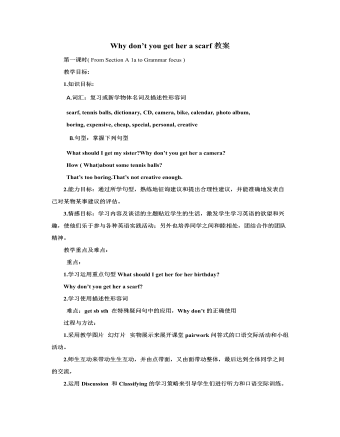
人教版新目标初中英语八年级下册Why don’t you get her a scarf教案
教师带领学生复习有关描述宠物的词汇,采用教师提问学生回答的方进行。如:T:What animals do you think would be good pets?What animals do you think would be bad pets?What do you think are good animals for a six-year-old child?然后学生进行 pairwork 练习。Task two: 师生互动,学习探究 1、播放3a部分的录音,引导学生一边听录音,一边跟读。2、通过听录音学生回答以下问题:Why do you think pot-bellied pigs are popular?What are the advantages and disadvantages of keeping such a pet?教师对学生的回答进行及时点评。3.学习范文,学习重点短语,为下步的模仿写作提供语言素材。T :1. )Have you ever kept a pig as a pet?Do you like pigs? St.:No.…Why don’t you like to keep a pig? St: No.They’re too dirty and lazy(Do you know in some foreign countries like Hollyland, Australia,pigs are the most popular pet.there’s a kind of pig.(图)it has an interesting name? it ‘s called a pot-bellied pig.) Now,let’s learn an article about this kind of interesting pet.2.)play the tapeSt.:Listen and repeat3.)show some Qs on computer(本子St.: read silently,then answerthe Qs(本子)4.)Ask ss. Close book and retell this passage.(what is a pot-bellied pig? Is it a good or bad pet? ) St.: retell it to each other“A pot –bellied pig is a popular pet now…”5.read the article together.St.:.practice reading

人教版新目标初中英语九年级下册By the time I got outside, the bus had already left教案
Ⅰ. Teaching Aims and Demands1. Knowledge Objects(1) Key Vocabularyoversleep(2) Target LanguageWhat happened?I overslept. And by the time I got up, my brother had already gotten in the shower.2. Ability Objects(1) Teach the students to use the new words.(2) Train the students to narrate past events with the Past Perfect Tense.(3) Train the students' listening and speaking skills with the target language.3. Moral ObjectIt’s a good habit to go to bed early in the evening and get up early in the morning. So you’ll never be in a hurry in the morning.Ⅱ. Teaching Key Points1. Key Vocabularyoversleep2. Target LanguageNarrate past events with the Past Perfect TenseⅢ. Teaching Difficult Points1. Train the students to narrate past events with the Past Perfect Tense.2. Train the students to understand the target language in spoken conversation.Ⅳ. Teaching Methods1. Thinking of examples from the students' real lives.2. Making sentences by looking at the pictures.Ⅴ. Teaching AidA tape recorderⅥ. Teaching ProceduresStep I Revision1. Revise the language points in Unit 8.Ask some questions like this: What volunteer work would you like to do?Help the students to answer, I’d like to…/I love to…/I hope to2. Practice the dialogue in Activity 3c on page 62 again. Get students to role play the similar dialogues with the following.

人教版新目标初中英语九年级下册Could you please tell me where the restrooms are教案
Step Ⅰ RevisionCheck homework. Ask a few students to read the article in 3a.Then ask a few students to read their guides.Step Ⅱ Part 1Look at the words in the box. Ask a student to read them. Make sure the students understand the meaning of the words. You are to fill in the blanks with the words. In some cases, students may need to use another form of the word, for example adjusting for tense or subject/ verb agreement.Ask students to fill in the blanks on their own.Check the answers. Step ⅢPart 2Go through the instructions with the class.Look at the example with the students.Ask students what the answer would be.Ask a student to read the question and answer it.Excuse me, could you tell me where the bank is, please?The bank is across the street from the shopping malt.Get students to complete the work in pairs.Check the answers. Ask a few students to read their questions.Step Ⅳ Just for Fun!Ask all the students to read the conversation. Ask: What is funny about this cartoon? Help students to explain. A Martian is a person from the planet Mars.There is no such thing as Martian food on Earth, and the clerk looks silly because he is trying to think of where there is a Martian restaurant.Invite some pairs of students to present this conversation to the rest of the class.Step Ⅴ Summary and HomeworkIn this class, we’ve done much writing practice using the key vocabulary words and the target language presented in this unit. After class, please finish the questions in 2 in your exercise books. Then finish the exercises on pages 47~48 of the workbook as well.The Seventh Period Ⅰ Teaching Aims and Demands1. Knowledge Objects(1) Key Vocabularyimage, adventure, jealousy, hero, crime, journey, brave, no longer, show interest in, take it easy, become interested in, plain looks(2)Text:Grown-ups like cartoons, too.2. Ability Objects(1) Fast-reading to get a general idea of the text.(2) Careful-reading to get the detailed information in the text.

人教版新目标初中英语九年级下册I’ll help clean up the city parks教案
Talk about offering help (P60)I’ll help clean up the city parks.A: I’d like to work ...B: You could help ...Talk about ways to tell people about the Clean-Up Day (P61)We need to ...We can’t ...I’ll ...Talk about the work the volunteers do (P62)These three students all volunteer their time to help other people.Somebody loves to ... / helps ... / plans to ... / wants to ...A: What do you like doing?B: I like ... A: What kind of volunteer work do you think I could do?B: You could ...1. 重点词汇advertisement, fix, repair, pleasure, blind, deaf, shut, carry, specially, fetch2. 认读词汇hunger, homeless, cheer, clean-up, sign, establish, major, commitment, elementary, veterinarian, coach, similar, call-in, strategy, disabled, organization, unable, support, appreciate, donation, part of speech, pronoun, adverb, preposition, conjunction, donate, Jimmy, Sally3. 词组clean up, cheer up, give out, put off, set up, think up, take after, fix up, give away, put up, hand out, work out, at once

人教版新目标初中英语九年级下册You’re supposed to shake hands教案
教学目标:1. 掌握本单元一些重点词汇的写法和用法。2. 学会自如谈论餐桌礼仪。Step 1 RevisionAsk some students to retell the customs at the table in France in the passage in 3a.Step 2 Self checkPart 1. Fill in each bland with the correct word given. Students do the exercises by themselves at first. Then check the answers. Ask the students to comprehend the sentences and help them point out uses of some words, like “arrive (at / in) sw., spend time / money on sth , spend time / money (in) doing sth.”Part 2. Read about Fan Ling’s experience in a western restaurant. Understand the passage. Point out some key points in the passage.1. be / get used to doing sth. 习惯做某事2. begin with = start with 以….开头3. crowd v. 挤满,塞满 the crowd 人群 crowded adj. 拥挤的Then students discuss about how she would solve her problem. Ask some to share their stories with others.Part 3. Complete the crossword by looking at the sentences on the left. Then check the answers.
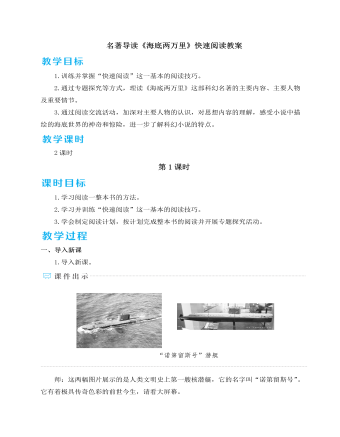
人教部编版七年级下册名著导读《海底两万里》快速阅读教案
【设计意图】这三个活动对培养学生的思维能力各有不同的目的和针对性。绘制航海路线图,讲述旅途精彩故事,可以帮助学生梳理全书的故事情节;写航海日记让学生深入到作品的情节中,对几个主人公的形象有更深入的理解;主题辩论既让学生对人物形象有更深入的思考,也有助于学生深入理解作品主题。三、活动结语师:读完《海底两万里》,相信同学们心中一定还有很多没有得到解答的疑问。尼摩船长的身世究竟是什么?他的亲人是怎么死的?他为什么要复仇?“诺第留斯号”潜艇最后的结局是什么呢?想要解开这些谜团,请看凡尔纳的另外两部科幻小说《格兰特船长的儿女》《神秘岛》,它们会带你揭开这些谜底。【设计意图】本环节旨在激发学生拓展阅读的兴趣,引导学生课外阅读凡尔纳的另外两部作品,扩大学生的阅读量。
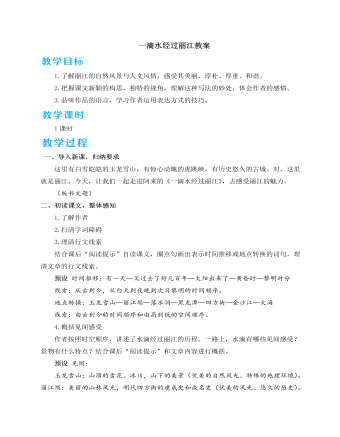
人教部编版语文八年级下册《一滴水经过丽江》教案
【设计意图】从诗意的语言入手,引导学生关注句式节奏、抒情性、叙事性、哲理性,品析语言,从而加深对文本的理解,体会作者对丽江的热爱、赞美之情,体会作者在景物描写中隐含的思想。五、总结存储1.教师总结作者虚构一个旅游者兼讲述者——“一滴水”,用它形成时空线索,串联起丽江的自然风光、历史文化、民俗风情,并着力表现景物背后的丽江的人文精神,来抒发作者对丽江古城与自然美妙融合的赞美之情,对丽江的醇美、和谐、沉静的赞美之情,对传统与现代文明和谐交融的赞美之情,对自然万物的热爱和生命平等的意识。诗意的语言中,有强烈的抒情,有厚重的历史感,有深邃的哲思。这“一滴水”折射出的,是阿来的思想、灵魂。2.布置作业(1)模仿本文的写法,写一篇不少于600字的随笔,选择一个恰当的视角,跨越时空,全面多角度展现家乡的自然风光、历史文化、风土人情。(2)课外阅读阿来的《大地的阶梯》,体会融景物、历史、感悟、思考于一体的游记风格。
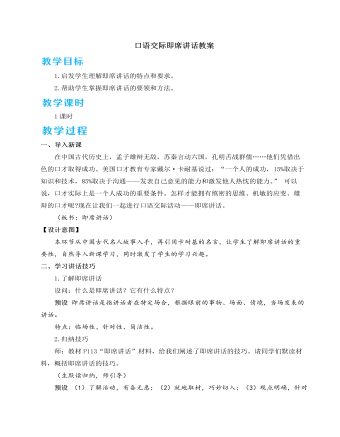
人教部编版语文八年级下册口语交际即席讲话教案
预设 示例:班上分享个人读书经验大家好!既然今天是交流读书体会,那么,我想结合自己的读书体会和大家聊聊读书。一个爱读书的民族,必定是一个文化素质较高的民族;一个爱读书的人,也必定是一个文化素质较高的人。读书能开阔我们的视野,提高我们的写作水平;读书能提升自身修养,丰富我们的人生底蕴。读书是我们精神的呼吸,能让人保持平淡的心境,变得博爱而无私。为了让我们的生活和心灵变得轻盈一些,我们需要读书。那么,应该怎样读书呢?其一,要择书而读。需要的才是最适合的,读适合的书才能有良多收获。如果没有特别需要的书要读,可以读经典。经典是经过岁月沉淀下来的人类智慧的结晶,可以让我们触摸先贤的思想,以充实自身。其二,要读而有术。要对好书反复品味,将其内化吸收,然后进行批判性阅读,有自己的思想主张和拓展探究价值判断;在读书过程中与作者进行辩论,最后形成自己的思想体系,为我所用,而不是让自己的脑袋成为别人思想的“跑马场”。
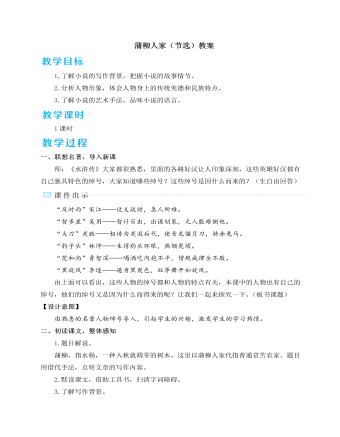
人教部编版语文九年级下册蒲柳人家(节选)教案
刘绍棠,中国当代著名乡土文学作家,1936年2月出生于河北通县(今北京通州区)大运河畔的儒林村,1949年开始发表作品,一生留下了500多万字的乡土文学作品,包括《地火》《京门脸子》等多部长篇小说,《蒲柳人家》《运河的桨声》等多部中篇小说,以及《青枝绿叶》《蛾眉》等多部短篇小说集。他的作品在国内多次获奖,在国际上亦有影响。刘绍棠的作品内容各不相同,但都艺术地再现了其家乡大运河畔不同历史时期的风土人情和社会风貌,描绘了充满诗情画意的乡风水色、世俗人情。20世纪80年代以来,刘绍棠不遗余力地倡导乡土文学,创作上坚持“中国气派,民族风格,地方特色,乡土题材”。文学评论家指出,他的作品格调清新淳朴,乡土色彩浓郁,形成了独具特色的大运河乡土文学风格。
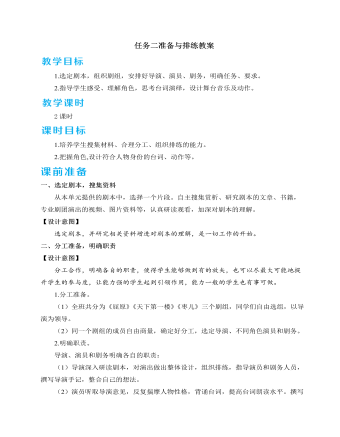
人教部编版语文九年级下册任务二准备与排练教案
教师指导:每个表演小组可选剧务两名,负责服装道具的制作和音乐的准备。负责服装道具的同学要动手能力强,有一定的美术功底。负责配乐的同学对音乐有所了解。在适当时候教师可以给剧务同学提供相应的帮助。【设计意图】教师在指导的基础上,组织学生进行排练,排练过程中把自主权交给学生,充分锻炼学生的合作能力。三、合作排练根据研讨反馈,导演组织全剧组排练,剧务根据表演需要设计制作场景、服装,演员反复合练,及时发现表演、舞台、配合等各方面的问题,为“任务三”正式演出做好准备。本次教学设计的任务是准备与排练,学生虽有参与的热情,但组织剧组,担任导演、剧务等工作尚缺乏相关经验,因此在活动中,老师在其中承担顾问工作,给予必要的指导。对于并未接受过专业表演训练的同学们来说,要演好剧情,演活剧本并非易事,还需要多尝试,多训练。因此,在进行必要的排练指导后,就放手让学生去排练。
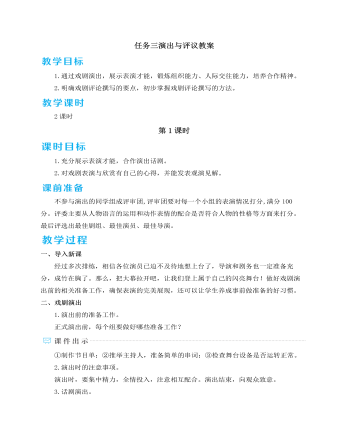
人教部编版语文九年级下册任务三演出与评议教案
从以下话题中任选其一(也可自选话题),写一篇作文,谈谈自己对剧本和戏剧表演的认识。不少于600字。①我为什么对“他”印象最深②舞台说明不只是“说明”③戏剧冲突面面观④台词应该怎样说⑤肢体语言很重要⑥配角也要演到位⑦“好戏”是配合出来的2.技法点拨。①写作时,结合对剧本和戏剧表演的认识,发表自己的见解和看法,力求明白晓畅,切勿写得深奥晦涩难懂。②阐述认识时,要列举剧本和戏剧表演的实例进行分析,便于读者理解和信服。③涉及把握不准的专业术语需查阅相关资料、典籍,规避错误,以免误导读者。④明确提出观点,筛选典型事例作为依据,分析材料与观点之间的关系。师:无论是选择哪一个话题,都要结合具体的实例进行分析,不能只列条目而无内容。针对某一戏剧或谈人物,或谈舞台说明,或谈矛盾冲突,或谈肢体语言,或谈相互配合等;也可以针对某个话题,列举多部戏剧中具体的一句、一段话,或一幕。
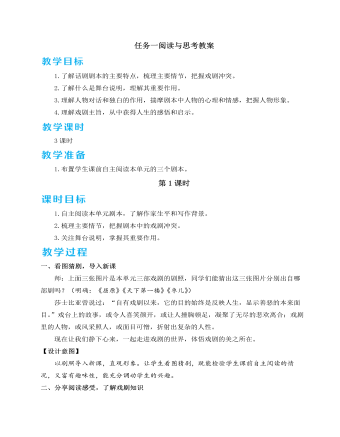
人教部编版语文九年级下册任务一阅读与思考教案
结束语:通过这节课的探究,我们了解了本单元三部戏剧的背景和主旨,相信大家对剧本的理解更深了。下节课,我们就要准备排练戏剧,希望大家课下再好好读读剧本,加深理解。五、布置作业1.课后查阅关于表演的相关资料,了解表演的知识。2.选择最喜欢的一个剧本熟读,并选择其中最喜欢的一个人物,揣摩应如何表演。剧本学习是一项新的教学内容,本次教学设计主要以人物为核心,从三个方面展开:(1)从文本的角度读剧本。从基本的情节入手,通过理解情节中的矛盾冲突来感知人物形象,让学生建立对剧本的基本理解。(2)从表演的角度读剧本。训练学生的朗读能力,引导学生通过台词来理解人物,为下阶段的舞台表演打下基础。(3)从现实的角度读剧本。指导学生认识剧本的现实意义,促进学生的成长。
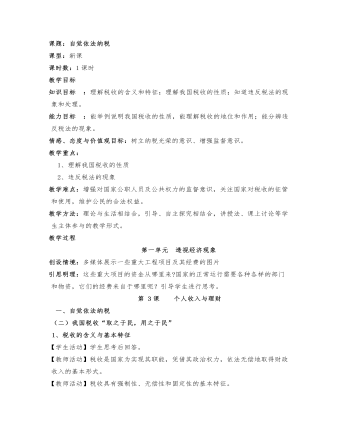
八年级思想政治下册自觉依法纳税教案
一、自觉依法纳税(二)我国税收“取之于民,用之于民” 1、税收的含义与基本特征 【学生活动】学生思考后回答。 【教师活动】税收是国家为实现其职能,凭借其政治权力,依法无偿地取得财政收入的基本形式。 【教师活动】税收具有强制性、无偿性和固定性的基本特征。[1]强制性:不管你愿意还是不愿意,都必须交税。[2]无偿性:交了税,没有补偿,更不会返还。[3]固定性:征税是有标准的,不是无止境的,按标准收到一定数量即算完成纳税。 2、税收的性质 【教师活动】展示多媒体图片,观察税收性质是什么? 【学生活动】分析图片,税收的性质。 【教师活动】每个人都与税收紧密地联系在一起,我们天天享受到的公共物品,无不有赖于税收。接受教育要有学校,看病要有医院,出行要有道路,保障国家安全要有国防,防洪、发电要有水利工程,这些都要依靠国家的税收来为公众提供公共服务。 【教师活动】播放国家免费为新冠肺炎患者治疗的视频。 【教师活动】劳动人民是税收的最终受益者,我国的税收是取之于民、用之于民的新型税收。
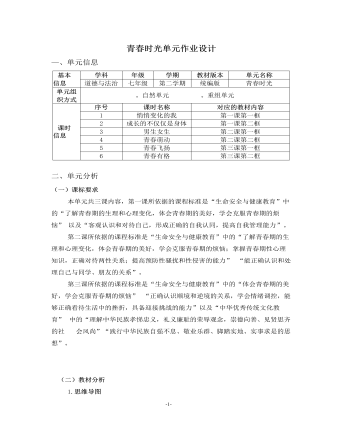
道德与法治七年级下册青春时光作业设计
二、非选择题【原创】11.以下是三个初中生的生活片段,请你运用所学知识,回答问题。片段一:上了初中的小伟感觉自己患上了“中二病",觉得现实的自己和想象 中的自己越来越脱节。在现实生活中越来越喜欢独处,不喜欢与他人交流;但是 却总是有着天马行空般的想象,认为自己将会“拯救世界”,成为英雄。片段二:阴阴说:“自从上了初中之后,妈妈越来越不理解我了,总是过多的 干涉我的生活,我常常在学习和生活上和妈妈发生争执。"片段三:小孙从小学时各科成绩就很优秀,上了初中后科目变得更多了,但小 孙仍然不惧困难,保持着勤奋的学习态度。但是他却发现自己不像小学时上课敢 主动回答问题了,老师提出的问题即使自己能够回答得出来也不再主动举手了。(1) 请问以上三个片段分别体现了青春期怎么样的心理矛盾。(2) 以上心理矛盾可能会产生怎样的影响?(3) 该如何克服青春期产生的心理矛盾呢?
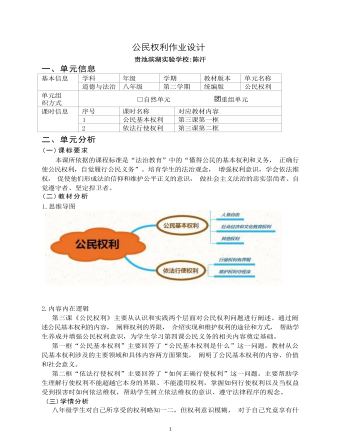
道德与法治八年级下册公民权利作业设计
4. 2021 年 10 月 7 日,公安机关接群众举报,网民“罗某平”在新浪微博发布侮辱抗 美援朝志愿军英烈的违法言论,造成恶劣影响。对此认识不正确的是( )A.英雄烈士不容亵渎,网络空间不是法外之地B.网民罗某平的行为是行使言论自由的表现C.网民罗某平的行为是以侮辱、诽谤的方式侵害了英雄烈士名誉、荣誉的行为 D.广大网民应自觉遵守法律法规,正确行使权利5.2022 年安徽省发布了《安徽省 12345 政务服务便民热线管理暂行办法》,12345 热线 办理工作实行首接负责制。承办单位接到转办工单后 1 个工作日内与诉求人取得联系, 告知诉求人受理情况和承办单位联系方式。对于诉求人 3 次以上重复反映或 5 人次以上 集中反映的事项,热线工作机构要跟踪督办。 此举能够( )A.保障公民行使监督权B.扩大公民的政治权利C.增强公民的自我保护D.解决公民的所有诉求6.向总理说句话,留言直达国务院。即日起至 2022 年全国两会期间,中国政府网联合 多家网络媒体平台, 以及各省区市、相关部委政府网站开展“我向总理说句话”网民建 言征集活动。这一做法( )A.能保障人民直接参与国家管理B.能及时解决网友提出的所有问题 C.有利于公民行使建议权、监督权 D.能广开言路,想说什么就说什么
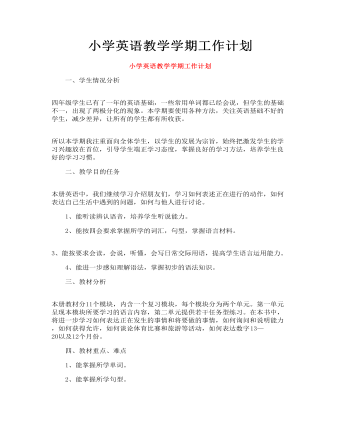
小学英语教学学期工作计划
1、能听读辨认语音,培养学生听说能力。 2、能按四会要求掌握所学的词汇,句型,掌握语言材料。 3、能按要求会读,会说,听懂,会写日常交际用语,提高学生语言运用能力。 4、能进一步感知理解语法,掌握初步的语法知识。
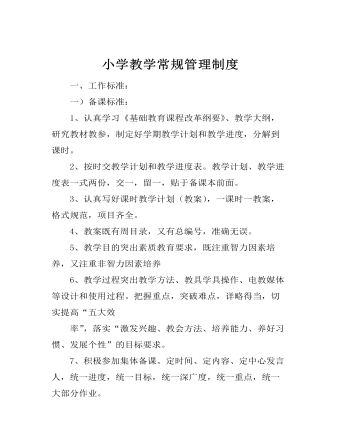
小学教学常规管理制度通用
1、认真学习《基础教育课程改革纲要》、教学大纲,研究教材教参,制定好学期教学计划和教学进度,分解到课时。 2、按时交教学计划和教学进度表。教学计划、教学进度表一式两份,交一,留一,贴于备课本前面。 3、认真写好课时教学计划(教案),一课时一教案,格式规范,项目齐全。 4、教案既有周目录,又有总编号,准确无误。 5、教学目的突出素质教育要求,既注重智力因素培养,又注重非智力因素培养 6、教学过程突出教学方法、教具学具操作、电教媒体等设计和使用过程。把握重点,突破难点,详略得当,切实提高“五大效 率”,落实“激发兴趣、教会方法、培养能力、养好习惯、发展个性”的目标要求。 7、积极参加集体备课。定时间、定内容、定中心发言人,统一进度,统一目标,统一深广度,统一重点,统一大部分作业。 8、教案保持余量一周。 9、同年级同学科禁止共用一本教案,应该做到每人一本教案。

小学学生社团管理制度(试行)
2、社团招募方式。一般每学期初进行社团招新和人员调整,控制人数避免增加管理难度。坚持“自愿参加”和“双向选择”的原则,学生报名社团要先经家长同意。社团老师和成员一经确定,无特殊情况一学期内不再变更。 3、活动时间地点。各社团制定科学合理的活动计划,每天按计划坚持开展活动,并做好记录。活动时间为下午放学后的3:50-4:30,地点要相对固定。学校努力为社团活动的开展创造条件。各班主任要熟知本班参加各社团的学生名单和活动时间,并通过致家长一封信、短信、家长会等途径将学生参加的社团名称、辅导老师和活动时间告知家长。










